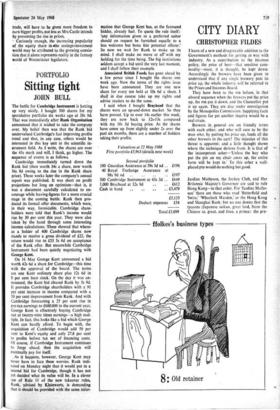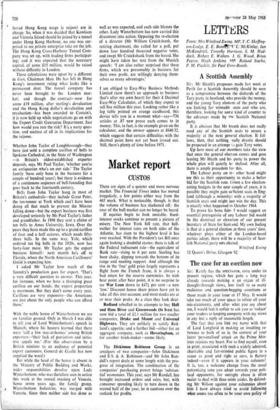CITY DIARY
CHRISTOPHER FILDES
I learn of a new and disagreeable addition to the Government's methods for getting its way with industry. As a contribution to the incomes policy, the price of beer—that sensitive com- modity—must, it is thought, be kept down. Accordingly the brewers have been given to understand that if any single brewery puts its price up, the whole industry will be referred to the Prices and Incomes Board.
They have been to the PIB before, in that absurd sequence when the brewers put the price up, the PIB put it down, and the Chancellor put it up again. They are also under investigation by the Monopolies Commission. Supplying facts and figures for yet another inquiry would be a real strain.
Brewers in general are on friendly terms with each other; and who will care to be the man who, by putting his price up, lands all the other brewers in the cart? The injustice of this threat is apparent; and a little thought shows where the technique derives from. It is that of the incompetent usher—'Unless the boy who put the pin on my chair owns up, the entire form will be kept in.' To this usher a well- placed pin would do nothing but good.
Jardine Matheson, the Jockey Club, and Her Britannic Majesty's Governor are said to rule Hong Kong—in that order. For 'Jardine Mathe- son' there are those who read 'Butterfield and Swire,"Wheelock Marden,' or the Hong Kong and Shanghai Bank; but no one denies that the tycoons (Japanese taikun, great lord, from the Chinese ta, great, and kiun, a prince: the pre- ferred Hong Kong usage is taipan) are in charge. So, when it was decided that Kowloon and Victoria Island should be joined by a tunnel under Hong Kong Harbour, no one was sur- prised to see private enterprise take on the job. The Hong Kong Cross-Harbour Tunnel Com- pany was set up, with leading firms participat- ing; and it was expected that the necessary capital, of some £15 million, would be raised without difficulty in London.
These calculations were upset by a different to kite:, Chairman Mao. He has left in Hong Kong's investment rating what looks like a permanent dent. The tunnel company has never been brought to the London mar- ket; and though the contract—now for some £19 million, after sterling's devaluation and the Hong Kong dollar's devaluation and revaluation—has been awarded to Costain's, it is now held up while negotiations go on with the Export Credit Guarantee Department. Just how would you rate the 'risk? It's a nasty ques- tion, and nastiest of all in its implications for the taipans.
Whether John Taylor of Loughborough—they have just sold a complete carillon of bells to Spokane Cathedral, in the State of Washington —is Britain's oldest-established exporter depends, says Mr Paul Taylor, 'whether you're an antiquarian who's on our side.' The Taylor family 'have only been in the business for a couple of hundred years; but there is evidence of a continuous sequence of bell-founding that goes back to the fourteenth century.
Bells from John Taylor hang in most of Britain's cathedrals—they include Great Peter, the ten-tonner at York which can't have been doing all •that much to prevent the Minster falling down—but the export business was first developed seriously by Mr Paul Taylor's father and grandfather. In 1898 they sent a chime of ten bells to Ames University, Iowa. Over the years they have made this up to a grand carillon of four and a half octaves, which needs fifty- three bells. In the same way, Yale, which ordered ten big bells in the 1920s, now has forty-four more. Mr Taylor gets the export business himself : next month he's off to Florida, where the North American Carilloners' Guild is expecting him.
I asked Mr Taylor how much of the foundry's production goes for export. 'That's a very difficult question to answer. This year, for instance, when we have a thumping great carillon on our hands, the export proportion is enormous. But they don't come every year. Carillons are very expensive—the Americans are just about the only people who can afford them.'
With the noble house of Winterbottom we are on familiar ground. Only in March I was able to tell you of Lord Winterbottom's speech in Munich, where his bearers learned that there wbre 'still a few stay-at-homes' among British exporters—`their lack of patriotism and initia- tive appals me.' (For this observation by a British minister to an audience of potential export customers, General de Gaulle has now supplied the word.) But while the head of the house is absent in the Ministry of Public Building and Works, wider responsibilities devolve upon Lady Winterbottom; who was therefore seen in action this week at the annual meeting of Venesta. Some seven years ago, the family group, i Winterbottom Industries, was merged with Venesta. Since then neither side has done as well as was expected, and each side blames the other. Lady Winterbottom has now carried this discontent into action. Opposing the re-election of a director (Mr William Cruickshank, the retiring chairman), she called for a poll, put down four hundred thousand negative votes, and swept Mr Cruickshank from the board. She might have taken her text from the Munich speech: 'I am also rather surprised that these firms, which are presumably in business for their own profit, are willingly denying them- selves so many advantages.
I am obliged to Easy-Way Business Methods Limited (now there's an approach to business that's after my own heart) for their £ Decimal Easy-Way Calculator, of which they expect to sell five million this year. Looking rather like a log table printed on orange cardboard, this device tells you in a moment what—say-736 articles at .87 new pence each comes to in money. This, in fact, is the example given on the calculator, and the answer appears at £640.32, which suggests that certain difficulties with the decimal point have not yet been ironed out. Still, there's plenty of time before 1971.







































 Previous page
Previous page